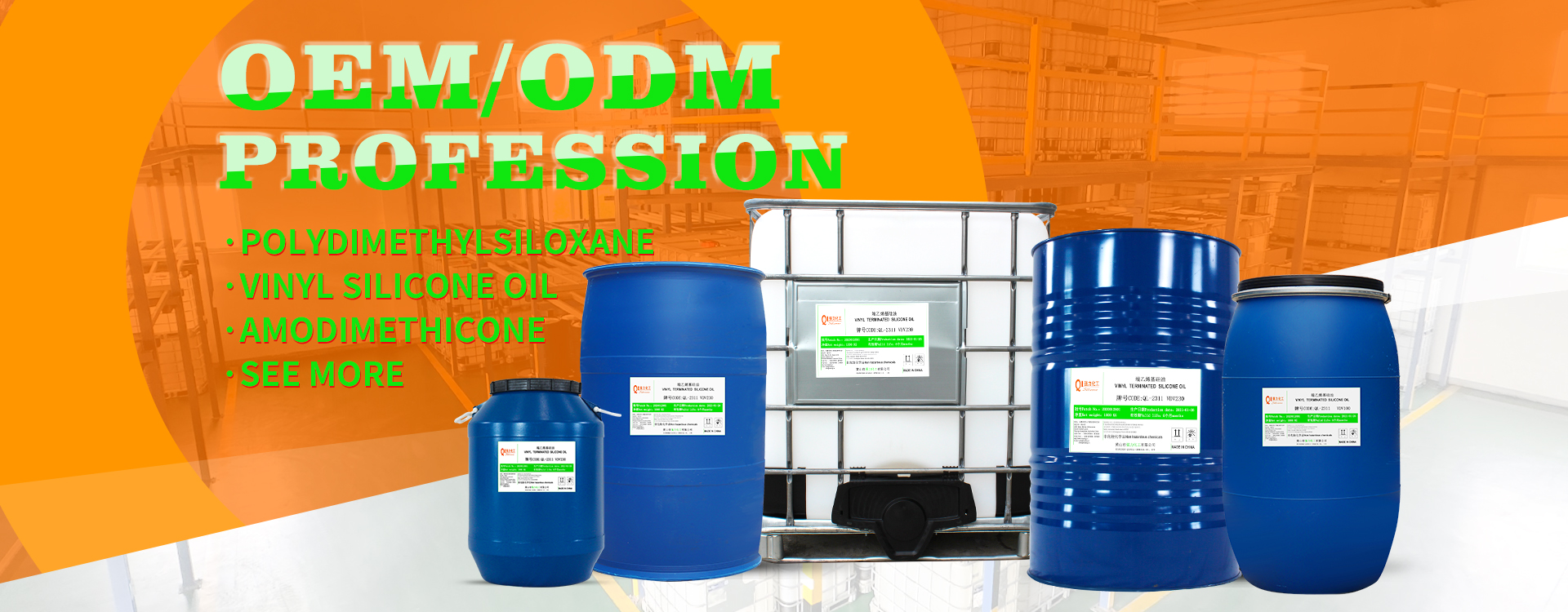In common silicone oils, we often encounter emulsified silicone oil and water-soluble silicone oil. So, what exactly is the difference between these two types of silicone oil? Let's first explore what these two types of silicone oil are.

Introduction to emulsified silicone oil
Emulsified silicone oil, also known as silk lubricant. Chemical properties are stable, non-volatile, non flammable, non corrosive to metals, and not easily gelatinized even when exposed to air for a long time.
Appearance: A white viscous liquid with a viscosity of about (100-350) × 10-6m2/s, a relative density of 0.98-1.02, almost odorless, insoluble in water (can be dispersed in water), ethanol, methanol, soluble in aromatic hydrocarbons, aliphatic hydrocarbons, and chlorinated hydrocarbons (such as benzene, carbon tetrachloride, etc.). In addition, emulsified silicone oil has excellent chemical stability, heat and cold resistance, weather resistance, lubricity, hydrophobicity, and low surface tension. It is non-toxic and harmless to the human body, making it widely used in personal care, food production, fermentation industry, and so on
Emulsified silicone oil
Appearance: White viscous liquid, methanol, soluble in aromatic hydrocarbons, aliphatic hydrocarbons, and chlorinated hydrocarbons (such as benzene, carbon tetrachloride, etc.). In addition, emulsified silicone oil has excellent chemical stability, heat and cold resistance, weather resistance, lubricity, hydrophobicity, and low surface tension. It is non-toxic and harmless to the human body, making it widely used in personal care, food production, fermentation industry, and so on
toxicity
1. In the acute toxicity test, mice were fed with emulsified silicone oil (at a dose of 20mL per kilogram of body weight) and observed for one week without any acute toxicity symptoms.
GRASFDA-21CFR182.1711.
Main purpose:
Can be used for hair care products, leather brighteners, automotive, furniture, flooring, metal processing, polyurethane, plastics, rubber, glass, ceramics, stone, textiles, papermaking, wood and other industries for demolding, polishing, anti sticking effect of plastic films, rust prevention of metals, softening and combing additives for shampoo, cleaning and waterproofing, and defoamers for water-based coatings
Application in shampoo
1. Solved the problem of astringency (i.e. non smooth feeling) in the contact area between hair and shampoo during wet combing, especially when the hair is half wet and half dry. This issue even exists in well-known Procter&Gamble products due to the improper selection of organic silicon molecular weight distribution. The astringency usually disappears when the hair is first dry, and it becomes evident the next day at noon or afternoon, and then persists, which is very unpleasant. This is the major flaw of current shampoo. This problem cannot be solved even with the EMU-120 from Maitu.
2. It has significant protective and conditioning effects, giving hair a unique silky softness that is soft and elastic. The hair is not greasy and suitable for long-term use. Long term use can keep hair uniquely silky soft and super organized, unlike other silicone oils that become soft at the beginning and hard after multiple uses.
3. The formula requirements are loose and not strict. Some silicone oils require very strict conditions (precise dosage of surfactants and cationic polymers), but their effectiveness is not so good.
To make hair smooth, organic silicon with a specific molecular weight distribution must be applied to the hair in a specific environment, and we have been studying this "specific" condition for many years. Specific cationic quaternary ammonium salt polymers also have a long-lasting softening effect on hair, but the effect is much weaker than that of organosilicon. Only organic silicon with a specific molecular weight distribution can exert super conditioning and softness on hair. If you want to pursue the perfect and smooth feeling of hair, the control of organic silicon must be strict! Foam interferes most seriously with the distribution and function of organosilicon in hair. And this' specific environment 'is nothing more than the use of organosilicon in combination with cationic polymers at a certain concentration of surface active agents. We recommend using high-quality cationic polymers such as Rhodia's guar gum C14S and cationic cellulose.
Application in food
Food grade emulsified silicone oil is a silicone defoamer mainly composed of methyl polysiloxane (silicone oil), which is a milky white liquid emulsified with dispersing auxiliary agents.
Properties of food grade emulsified silicone oil:
1. It is a non-polar compound that does not interact with water or substances with polar genes, therefore it has a strong defoaming effect and requires very low dosage.
2. The chemical properties are stable, and the secondary exposure gas does not gelatinize or interact with the product.
3. It has high temperature resistance and chemical resistance, and can fully exert its defoaming effect under high temperature conditions, acidic and alkaline media.
4. Difficult to ignite.
5. Low toxicity, clinical trials both domestically and internationally have shown no toxicity. The United States, the United Kingdom, Japan, France and other countries have legally designated defoamers for the food and chemical industry.
Dosage: Food grade emulsified silicone oil. Scope and dosage of use. According to China's "Hygienic Standards for the Use of Food Additives" (GB 2920-1996), it can be used in fermentation processes with a maximum dosage of 0.2g/kg; Beverage, 10mg/L (calculated as polydimethylsiloxane).
Appearance: White viscous liquid, soluble in aromatic hydrocarbons, aliphatic hydrocarbons, and chlorinated hydrocarbons (such as benzene, carbon tetrachloride, etc.). Chemical properties are stable, non-volatile, non flammable, non corrosive to metals, and not easily gelatinized even when exposed to air for a long time.
Usage: Defoamer.
Usage and dosage: Emulsified silicone oil can be directly added to the product in the later stage of the process, and stirred evenly. The dosage of emulsified silicone oil can be diluted with water according to customer product requirements. It is recommended to add 0.1-0.4%.
Introduction to water-soluble silicone oil
Polysiloxane poly (alkoxy ether) copolymer, also known as foaming agent or water-soluble silicone oil, is formed by first hydrolyzing chlorosilane to produce polysiloxane, and then condensing it with polyether. Yellow or brownish yellow oily viscous transparent liquid. Relative density (25 ℃/25 ℃) 1.04-1.08, acid value<0.2mgKOH/g. Viscosity (50 ℃) (1.5-5) × 10-4m2/s.
Used as a foaming stabilizer for polyurethane. Reference dosage is 1%. Store in a cool and ventilated warehouse, moisture-proof and fireproof.
Technical indicators
1. Appearance: Light yellow transparent liquid
2. Viscosity (25 ℃, mpa.S):300 ~ 3000
3. Density (25 ℃, g/cm3): 1.01-1.03
4. Refractive index (25 ℃): 1.440-1.450
5. Water solubility: Dissolve
Performance and Application
Water soluble silicone oil is a reactive non-ionic surfactant that is soluble in water, alcohols, aromatic hydrocarbons, alcohols, acetone, and other substances. This product is non-toxic, non corrosive, and does not pollute the environment.
Water soluble silicone oil can be used alone in the form of an aqueous solution for fabrics or added to resin finishing work baths. It is suitable for various fiber fabrics, such as polyester, nylon, cotton, polyester cotton, wool, synthetic silk, etc. It can significantly improve the feel of the fabric, anti-static, and enhance washing and stain resistance.
1. Water soluble silicone oil can be widely used in daily chemical products, such as various pastes, emulsions, and shampoos. Hair washed with shampoo containing water-soluble silicone oil is loose, soft, and shiny, with good combing ability.
2. Water soluble silicone oil can also be used in the leather industry and is the main component of advanced leather lubricants and finishing agents. It endows various natural leather surfaces with properties such as smoothness, brightness, softness, and comfortable hand feel.
3. Water soluble silicone oil is also an excellent additive for various coatings, which can improve the leveling of coatings and make the coating surface smooth and shiny.
4. Water soluble silicone oil can also be used as a plastic additive and release agent.
characteristic
1. Low surface tension.
2. Good softness and anti-static properties.
3. Good viscosity reduction and leveling properties, suitable for adding to various resins (such as polyurethane resins, paint resins, plastic resins, etc.), can effectively improve the intermolecular stress of these resins, overcome the shortcomings of these resins themselves, and obtain new properties.
4. Good lubricity, suitable for producing high-end cutting fluids.
5. Good demulsification performance, suitable for oil-water separation in certain specific situations.
The difference between emulsified silicone oil and water-based silicone oil
Emulsified silicone oil is the silicone oil lotion obtained by emulsification with emulsifier. Water soluble silicone oil refers to the hydrophilic silicone oil synthesized by grafting hydrophilic groups on silicone oil (high cost, poor performance, but convenient application)
Emulsified silicone oil can be used in hair care products, leather brighteners, automotive, furniture, flooring, metal processing, polyurethane, plastics, rubber, glass, ceramics, stone, textile, papermaking, wood and other industries for demolding, polishing, anti sticking effect of plastic films, rust prevention of metals, softening and combing additives for shampoo, cleaning and waterproofing, and defoamers for water-based coatings
Water soluble silicone oil is a reactive non-ionic surfactant that is soluble in water, alcohols, aromatic hydrocarbons, alcohols, acetone, and other substances. This product is non-toxic, non corrosive, and does not pollute the environment.
Water soluble silicone oil can be used alone in the form of an aqueous solution for fabrics or added to resin finishing work baths. It is suitable for various fiber fabrics, such as polyester, nylon, cotton, polyester cotton, wool, synthetic silk, etc. It can significantly improve the feel of the fabric, anti-static, and enhance washing and stain resistance.
1. Water soluble silicone oil can be widely used in daily chemical products, such as various pastes, emulsions, and shampoos. Hair washed with shampoo containing water-soluble silicone oil is loose, soft, and shiny, with good combing ability.
2. Water soluble silicone oil can also be used in the leather industry and is the main component of advanced leather lubricants and finishing agents. It endows various natural leather surfaces with properties such as smoothness, brightness, softness, and comfortable hand feel.
3. Water soluble silicone oil is also an excellent additive for various coatings, which can improve the leveling of coatings and make the coating surface smooth and shiny.
4. Water soluble silicone oil can also be used as a plastic additive and release agent.




